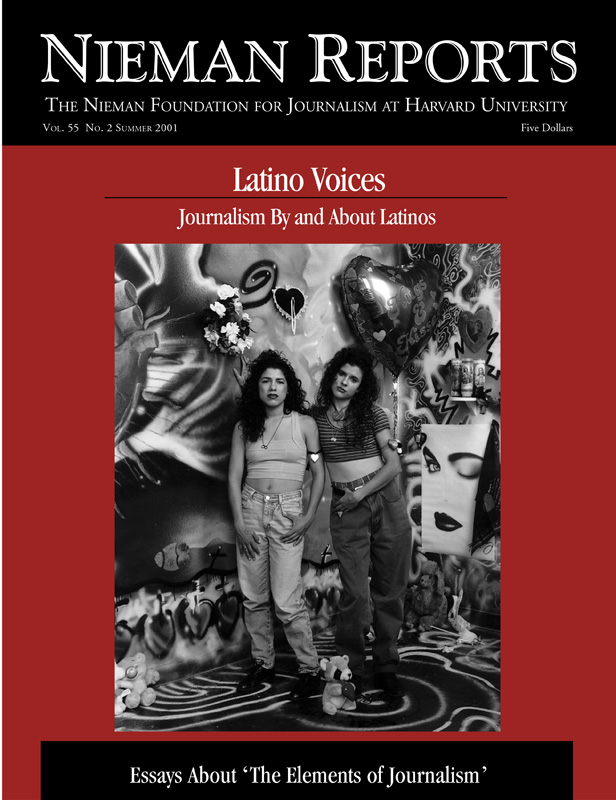“...This forum function of the press would make it possible to create a democracy even in a large, diverse country by encouraging what James Madison and others considered the basis upon which democracy would stand—compromise, compromise, compromise....
In the new age of media, it is more incumbent on those providing us with journalism that they decipher the spin and lies of commercialized argument, lobbying, and political propaganda. ...it is more important, not less, that this public discussion be built on the same principles as the rest of journalism—starting with truthfulness, facts, and verification. For a forum without regard for facts fails to inform. A debate steeped in prejudice and supposition only inflames. Just as important, this forum must be for all parts of the community, not just the affluent or demographically attractive....
Some people might consider this argument for stewardship anachronistic—and more than a little elitist—a leftover from an era when only a few outlets controlled public access to information.... Now we can let the journalist mediator get out of the way, and let the debate occur in the genuine public square, not the artificial one defined by NBC or CBS News.
This is where the technology-verses-journalism debate comes to its clearest philosophical divide.
...it is appealing, on some level, to think that technology will free those who produce the news from having to exercise judgment and responsibility...[but] it is creating a public square with a diminished regard for fact, fairness, and responsibility. Facts are replaced by whatever sells—or can be sold. Spin replaces verification. Right becomes a matter of who has the greatest might—wattage, audience, rhetorical skill.
In practice, unfortunately, the technological argument is the digital equivalent of tyranny, not freedom. Rather than liberated, we become captive to the technology....
The problem with...the Argument culture—the diminished level of reporting, the devaluing of experts, the emphasis on a narrow range of blockbuster stories, and the emphasis on an oversimplified, polarized debate—is that [it tends] to disenfranchise people from the discussion that the media not only are supposed to support but need for their own survival. Making politics into a shouting match drives people away from the media....
The press has a stake in that discussion being inclusive and nuanced, and an accurate reflection of where the debate in society actually exists, as well as where the points of agreement are."
In the new age of media, it is more incumbent on those providing us with journalism that they decipher the spin and lies of commercialized argument, lobbying, and political propaganda. ...it is more important, not less, that this public discussion be built on the same principles as the rest of journalism—starting with truthfulness, facts, and verification. For a forum without regard for facts fails to inform. A debate steeped in prejudice and supposition only inflames. Just as important, this forum must be for all parts of the community, not just the affluent or demographically attractive....
Some people might consider this argument for stewardship anachronistic—and more than a little elitist—a leftover from an era when only a few outlets controlled public access to information.... Now we can let the journalist mediator get out of the way, and let the debate occur in the genuine public square, not the artificial one defined by NBC or CBS News.
This is where the technology-verses-journalism debate comes to its clearest philosophical divide.
...it is appealing, on some level, to think that technology will free those who produce the news from having to exercise judgment and responsibility...[but] it is creating a public square with a diminished regard for fact, fairness, and responsibility. Facts are replaced by whatever sells—or can be sold. Spin replaces verification. Right becomes a matter of who has the greatest might—wattage, audience, rhetorical skill.
In practice, unfortunately, the technological argument is the digital equivalent of tyranny, not freedom. Rather than liberated, we become captive to the technology....
The problem with...the Argument culture—the diminished level of reporting, the devaluing of experts, the emphasis on a narrow range of blockbuster stories, and the emphasis on an oversimplified, polarized debate—is that [it tends] to disenfranchise people from the discussion that the media not only are supposed to support but need for their own survival. Making politics into a shouting match drives people away from the media....
The press has a stake in that discussion being inclusive and nuanced, and an accurate reflection of where the debate in society actually exists, as well as where the points of agreement are."



